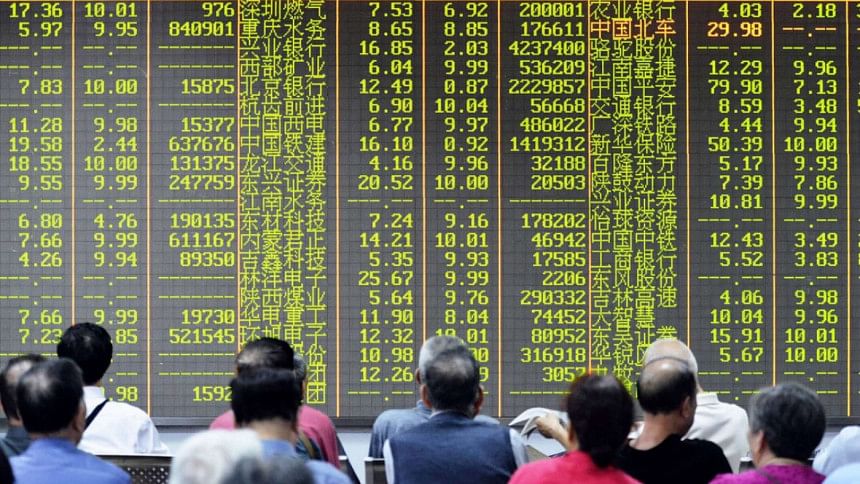China's political interventions

IN the last week or so, stock markets around the world have been hit by an upsurge in volatility, with large price swings confronting traders in New York, Tokyo, London, and beyond. And the entire global financial spasm has been largely blamed on a single culprit: China.
In a free economy, market mechanisms can produce stability or instability. An increase in the price of a tangible good would typically cause demand to fall, leading the market toward a new equilibrium. By contrast, an increase in the price of an asset like a stock raises expectations of a further increase, causing demand to rise, potentially to excessively high levels.
In a planned economy like China's, where policymakers use various tools to influence asset prices, such instability could, in theory, be avoided; indeed, the Marxist view is that government intervention to stop crises is precisely why controlled economies are superior to their free-market counterparts. But, in practice, that does not seem to be the case.
So-called price-keeping operations by China's monetary authorities (an approach tried in Japan in the early 1990s) are presumably the reason why the domestic stock market rose sharply over the last year, far beyond the levels warranted by the country's economic fundamentals. The recent stock-market plunge suggests that investors have concluded that equity prices have become unsustainable.
Yet, the Chinese government has remained committed to intervention, responding to the correction with heavy-handed, politically motivated measures, including the complete suspension of trade of many companies' stocks. The move seemed to have halted the further deterioration of the Shanghai stock market. But the effect was only temporary; on August 24, the market fell by 8.5 percent, the largest drop since 2007.
The long-term systemic impact of China's interventionist approach may be even more serious than the stock market's current decline. Few want to invest in a market where the government can change the rules of the game at any time, especially if they have had first-hand experience of being blocked from trading at a crucial moment. To make matters worse, Chinese investors do not have the same access to information that investors in other markets do. Can a highly organised financial market like the one that is emerging in Shanghai ever be compatible with an authoritarian regime?
Another recent intervention by the Chinese authorities - gradual appreciation, followed by the unexpected devaluation of the renminbi - raises similar questions. To be sure, the first part of the move was probably motivated largely by the desire to strengthen markets' role in setting the exchange rate, which promises to boost long-term stability and improve the renminbi's chances of becoming a global reserve currency. But, as the recent devaluation showed, the shift, coming after years of efforts to strengthen the renminbi, could fuel a sharp increase in volatility in world currency markets.
Of course, the renminbi's recent depreciation was much smaller than the de facto currency devaluations engineered by the United States and the United Kingdom after the financial crisis of 2008. It was also nowhere near as significant as the devaluation that the Bank of Japan has pursued since 2012. But the fact that the renminbi has been so highly managed, together with its history of steady appreciation, meant that the sudden devaluation had a more significant effect on the market than the US, British, and Japanese moves, all of which were communicated better in advance.
Still, warnings that renminbi devaluation will spark a "currency war" are unwarranted. Under the flexible exchange-rate system that now prevails around the world, if each country focuses its monetary policy on achieving ideal inflation and employment conditions at home, the result will be reasonably stable – or even so-called Pareto-optimal – macroeconomic conditions. To be sure, the US may respond to China's devaluation by postponing interest-rate hikes or moderating the pace of its withdrawal from quantitative easing, and Japan may intensify its own QE to cope with negative spillovers. But competitive cumulative devaluations will not arise.
Nonetheless, recent events should compel China's leaders to reconsider the extent to which they control the country's economy. If they maintain their secretive decision-making and continue to manipulate the price system for political ends, their chances of building a stable, resilient, and market-oriented economy, underpinned by a major international reserve currency, will be seriously compromised.
The writer is Special Economic Adviser to Japanese Prime Minister Shinzo Abe, Professor Emeritus of Economics at Yale University and at the University of Tokyo.
Copyright: Project Syndicate, 2015.
www.project-syndicate.org
Exclusive to The Daily Star

 For all latest news, follow The Daily Star's Google News channel.
For all latest news, follow The Daily Star's Google News channel. 



Comments